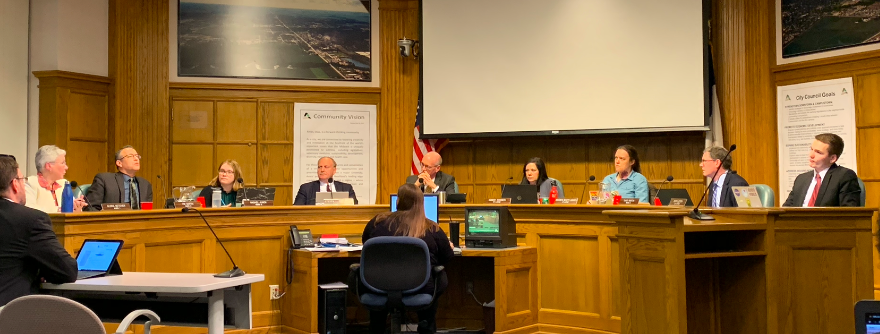Ames City Council manages delinquent municipal utilities related to COVID-19
September 8, 2020
As delinquent municipal utilities increase, the Ames City Council voted in favor of requesting allocated funds to assist customers during the pandemic.
The amount of outstanding municipal utilities is up to $750,000, the Ames City Council voted to request a waiver to allow the use of the Community Block Development Grant toward this revenue. Council voted for Ames Mayor John Haila to contact the offices of Sen. Joni Ernst and Sen. Chuck Grassley as the amount continues to grow each month.
The city will notify delinquent accounts to contact the finance department to set up a payment plan or to possibly qualify for the funding if it is granted. Customers will be sent a letter notifying them of the status of their account. If there is no response after 10 to 14 days, the finance department will contact the customer through a phone call or email to figure out a payment plan. If there is still no response after multiple notices, the city will proceed to cut off the customer’s electricity.
“If we don’t start the process now, remember we go through a whole month the whole cycle,” said Ames City Manager Steve Schainker. “We are getting to the spot where it kicks in, I believe no later than the end of October or somewhere around there, that you can’t shut off certain groups of people until April. Which sounds good, but all these people, their amount due keeps growing and growing. It is just going to be a terrible burden to have to pay back later on even with a payment plan and then to go forward and pay for their utilities. We want to see if we can help them before this bill keeps growing.”
This topic was also a matter of discussion for Iowa State students and the Ames Black Lives Matter (BLM) movement. When this issue was first addressed in late June, students confronted the matter during a Black Lives Matter protest.
“When we look at water usage across the globe, less than 10 percent alone is your individual usage — that’s you showering, that’s you drinking water, that’s you cooking — 20 percent [of water usage is] industry and 70 percent agriculture,” said Ahmed Ismail, a senior in industrial engineering and an Ames BLM leader at the protest. “Why are we getting shut off first in the pandemic? On top of that 55 million claims for unemployment since April […] why are we not supporting our people?”
The city of Ames has ceased disconnecting customers with a delinquent or unpaid account, mirroring the actions of privately owned utilities in Iowa in response to the COVID-19 outbreak. Because of this, the city has not issued a disconnect notice since mid-March.
The Housing and Urban Development (HUD) rules allow private utilities to be covered, but not municipal utilities, but the rental assistance and mortgage assistance is still allotted under the grant because the city is paying private property owners. Haila said there is no guarantee that the request will yield positive results but the Council is dedicated to trying.
“I don’t have a direct hotline to Joni Ernst but I do certainly have their chief of staff in Des Moines and he is certainly interested in helping us in central Iowa,” Haila said. “I think we want to pull all of the stops out and see if we can apply pressure and get this taken care of as quickly as possible to help those residents who do have needs.”
If the funds are granted to the city, customers are eligible for the funds if the reason for the outstanding bill is a COVID-19 related issue such as job loss or wage cuts from March until now.
“We are doing well, but there are still people who are really hurting,” Ward 2 Rep. Tim Gartin said. “I just assume they would pay these things if they could, it is just a reflection of the financial stress we are undergoing because of COVID-19.”







